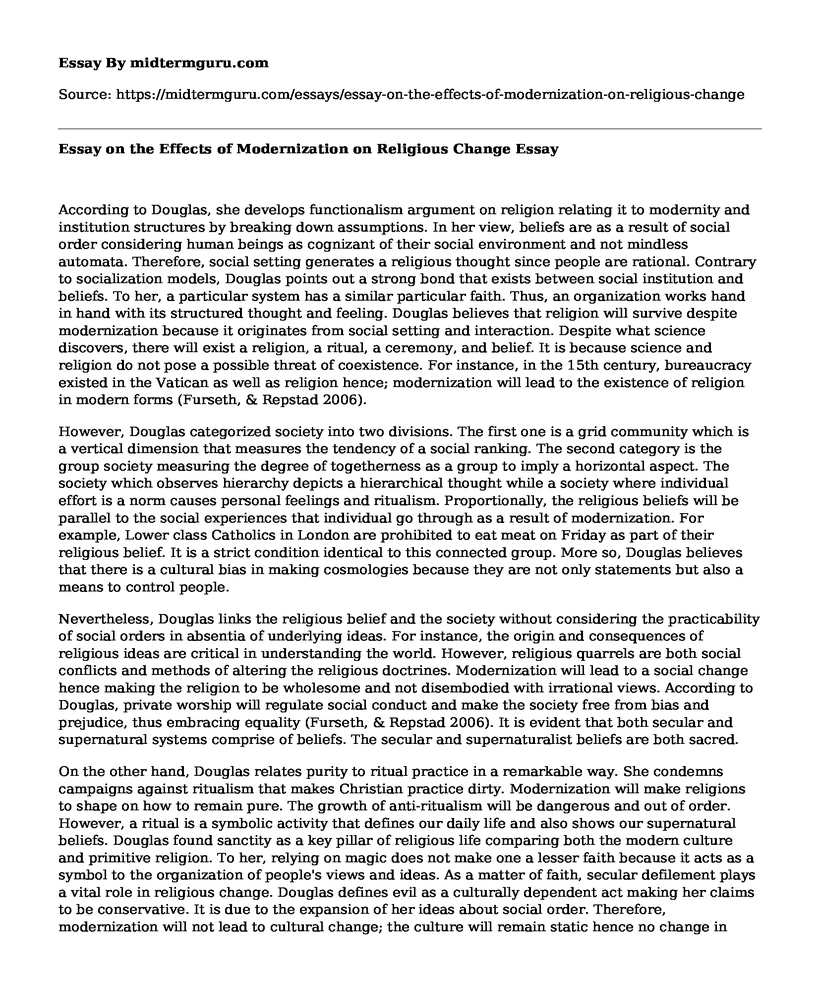According to Douglas, she develops functionalism argument on religion relating it to modernity and institution structures by breaking down assumptions. In her view, beliefs are as a result of social order considering human beings as cognizant of their social environment and not mindless automata. Therefore, social setting generates a religious thought since people are rational. Contrary to socialization models, Douglas points out a strong bond that exists between social institution and beliefs. To her, a particular system has a similar particular faith. Thus, an organization works hand in hand with its structured thought and feeling. Douglas believes that religion will survive despite modernization because it originates from social setting and interaction. Despite what science discovers, there will exist a religion, a ritual, a ceremony, and belief. It is because science and religion do not pose a possible threat of coexistence. For instance, in the 15th century, bureaucracy existed in the Vatican as well as religion hence; modernization will lead to the existence of religion in modern forms (Furseth, & Repstad 2006).
However, Douglas categorized society into two divisions. The first one is a grid community which is a vertical dimension that measures the tendency of a social ranking. The second category is the group society measuring the degree of togetherness as a group to imply a horizontal aspect. The society which observes hierarchy depicts a hierarchical thought while a society where individual effort is a norm causes personal feelings and ritualism. Proportionally, the religious beliefs will be parallel to the social experiences that individual go through as a result of modernization. For example, Lower class Catholics in London are prohibited to eat meat on Friday as part of their religious belief. It is a strict condition identical to this connected group. More so, Douglas believes that there is a cultural bias in making cosmologies because they are not only statements but also a means to control people.
Nevertheless, Douglas links the religious belief and the society without considering the practicability of social orders in absentia of underlying ideas. For instance, the origin and consequences of religious ideas are critical in understanding the world. However, religious quarrels are both social conflicts and methods of altering the religious doctrines. Modernization will lead to a social change hence making the religion to be wholesome and not disembodied with irrational views. According to Douglas, private worship will regulate social conduct and make the society free from bias and prejudice, thus embracing equality (Furseth, & Repstad 2006). It is evident that both secular and supernatural systems comprise of beliefs. The secular and supernaturalist beliefs are both sacred.
On the other hand, Douglas relates purity to ritual practice in a remarkable way. She condemns campaigns against ritualism that makes Christian practice dirty. Modernization will make religions to shape on how to remain pure. The growth of anti-ritualism will be dangerous and out of order. However, a ritual is a symbolic activity that defines our daily life and also shows our supernatural beliefs. Douglas found sanctity as a key pillar of religious life comparing both the modern culture and primitive religion. To her, relying on magic does not make one a lesser faith because it acts as a symbol to the organization of people's views and ideas. As a matter of faith, secular defilement plays a vital role in religious change. Douglas defines evil as a culturally dependent act making her claims to be conservative. It is due to the expansion of her ideas about social order. Therefore, modernization will not lead to cultural change; the culture will remain static hence no change in religions. It is a shortfall in understanding social changes.
Conclusion
Douglas has contributed significantly in the field of religion and anthropology in explaining the fundamentals of human understanding and the social experiences. The idea of modernization leads to the formation of modern cultures that have their beliefs constraint to their social environment hence identifying different faith particular to an individual or a group social order. Therefore, religion can prevent disorder and pollution by making the members more conservative. It will also preserve the faith that believers have in a particular religion.
Reference
Furseth, I., & Repstad, P. (2006). Classical and contemporary perspectives. Place of publication not identified: Ashgate.
Cite this page
Essay on the Effects of Modernization on Religious Change. (2021, Jun 07). Retrieved from https://midtermguru.com/essays/essay-on-the-effects-of-modernization-on-religious-change
If you are the original author of this essay and no longer wish to have it published on the midtermguru.com website, please click below to request its removal:
- Essay on Black Lives Matter Movement and Increase of Crime Rate
- Critical Essay on Race, Police, and the Making of a Political Identity
- The Theme of Gender and Sexuality in Ancient Rome - Essay Sample
- Online Communication and its Impacts - Research Paper
- Exploring the Moral Debate on Suicide - Research Paper
- Utopia Unreachable: The Consequences of Perfect Societies - Essay Sample
- Article Analysis Essay on Beyond Binaries: Depolarizing the Categories of Sex, Sexuality, and Gender







